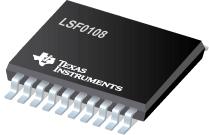●LSF family supports up to 100 MHz up translation and greater than 100 MHz down translation at ≤ 30pF cap load and up to 40 MHz up/down translation at 50 pF cap load which allows the LSF family to support more consumer or telecom interfaces (MDIO or SDIO). The LSF family has bidirectional voltage translation without the need for DIR pin which minimizes system effort (for PMBus, I2C, or SMbus).
●LSF family supports 5 V tolerance on IO port which makes it compatible with TTL levels in industrial and telecom applications. The LSF family is able to set up different voltage translation levels on each channel which makes it very flexible.
● Provides Bidirectional Voltage Translation With No
●Direction Pin
● Supports Up to 100 MHz Up Translation and
●Greater Than 100 MHz Down Translation at
●≤ 30pF Cap Load and Up To 40 MHz Up/Down
●Translation at 50 pF Cap Load
● Supports Hot Insertion
● Allow Bidirectional Voltage Level Translation
●Between
● 0.95 V ↔ 1.8/2.5/3.3/5 V
● 1.2 V ↔ 1.8/2.5/3.3/5 V
● 1.8 V ↔ 2.5/3.3/5 V
● 2.5 V ↔ 3.3/5 V
● 3.3 V ↔ 5 V
● Low Standby Current
● 5 V Tolerance I/O Port to Support TTL
● Low Ron Provides Less Signal Distortion
● High-Impedance I/O pins For EN = Low
● Flow-Through Pinout for Ease PCB Trace Routing
● Latch-Up Performance Exceeds 100 mA Per
●JESD 17
● –40°C to 125°C Operating Temperature Range
● ESD Performance Tested Per JESD 22
● 2000 V Human-Body Model (A114-B, Class II)
● 200 V Machine Model (A115-A)
● 1000 V Charged-Device Model (C101)



